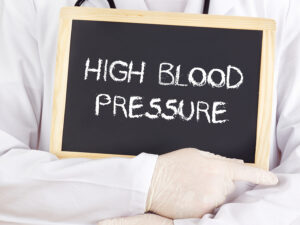Risks of Developing High Blood Pressure
High blood pressure is common in the elderly and can lead to many other health issues. As a person gets older, their vascular system changes and ages, increasing the odds of high blood pressure developing. The arteries often get more stiff, causing blood pressure to escalate. This can happen to anyone, even someone who practices a healthy lifestyle of eating well, getting exercise, and the recommended amount of sleep.

Skilled Nursing Arlington, VA: High Blood Pressure
There are often no symptoms of high blood pressure so it’s sometimes been called the “silent killer,” because people don’t know they have it until it’s caused some serious complication or even death such as a stroke or heart attack.
Some people are more at risk for developing high blood pressure so knowing the risk factors that increase the possibility of developing high blood pressure can help you and your aging loved one make better choices for avoiding it. You can also share these risk factors with other care providers such as his physician, his skilled nursing staff that comes to the home, and even his dentist.
As stated, anyone can have high blood pressure but certain risk factors will increase the chance of developing it. Those risk factors are:
- Already being diagnosed with certain conditions such as thyroid problems, kidney disease, and metabolic syndrome. If your loved one is already having a skilled nursing care provider come to the home for these conditions, you can also request a blood pressure check with each visit to monitor his blood pressure.
- Age. Simply getting older increases the risk of high blood pressure.
- Gender. While men are more likely to have high blood pressure before the age of 55, women develop a stronger possibility of getting it after menopause.
- Family history. If you have a family medical history of individuals with high blood pressure, it’s more likely your elderly loved one will develop it as well.
- Race. African Americans are more likely to develop high blood pressure.
Staying on top of your loved one’s blood pressure levels is a painless and easy procedure. He will have his blood pressure checked with each doctor visit, and sometimes other medical visits may check his blood pressure as well – the pharmacist may check it (or at least have a machine to check it), as well as his dentist may check it before providing a procedure such as a root canal.
You can also have a skilled nursing care provider check his blood pressure more regularly if you find that it is rising and should be monitored. Your loved one’s doctor may even request for it to be monitored more often. Your elderly loved one can do it right in his own home without having to make a trip somewhere else. This can be very helpful during the cold winter months or if your loved one has a condition that gives him a weakened immune system.
If high blood pressure becomes a consistent issue, your loved one’s doctor will help him find ways to manage it.
If you or an aging loved-one is considering Skilled Nursing in Arlington, VA please contact the caring staff at Thrive Health Care Services today. (703) 992-0484
